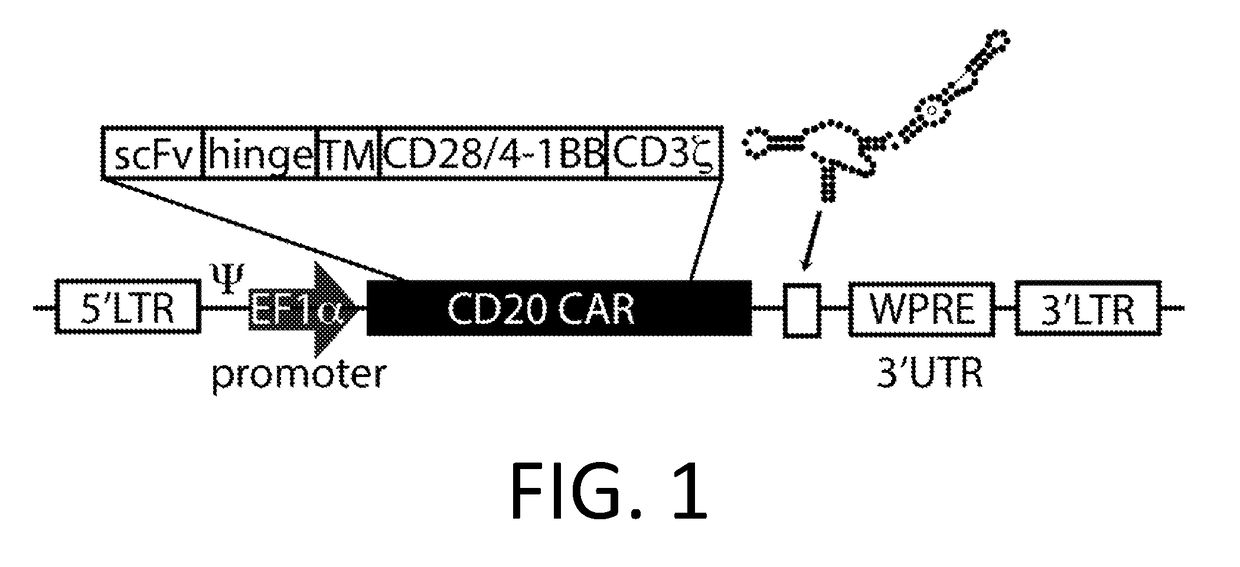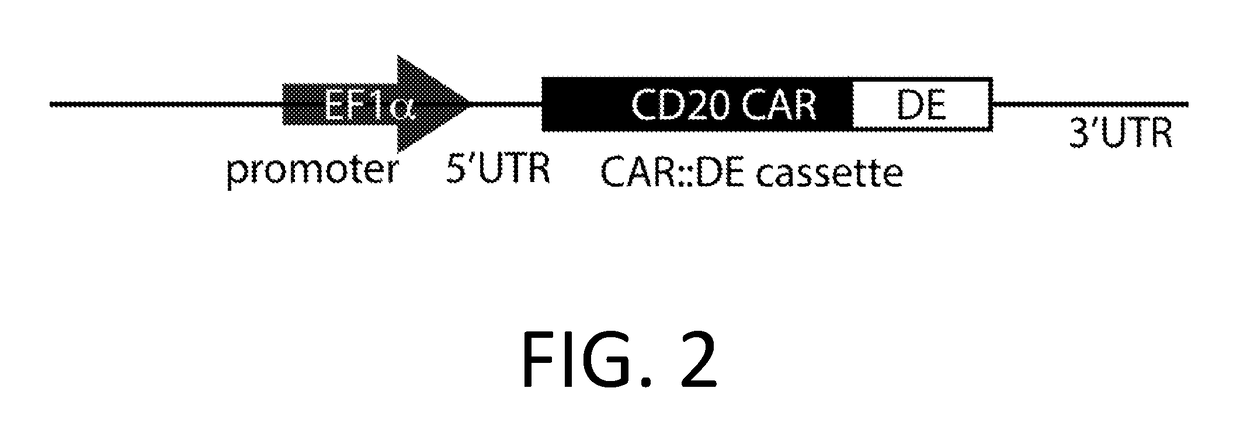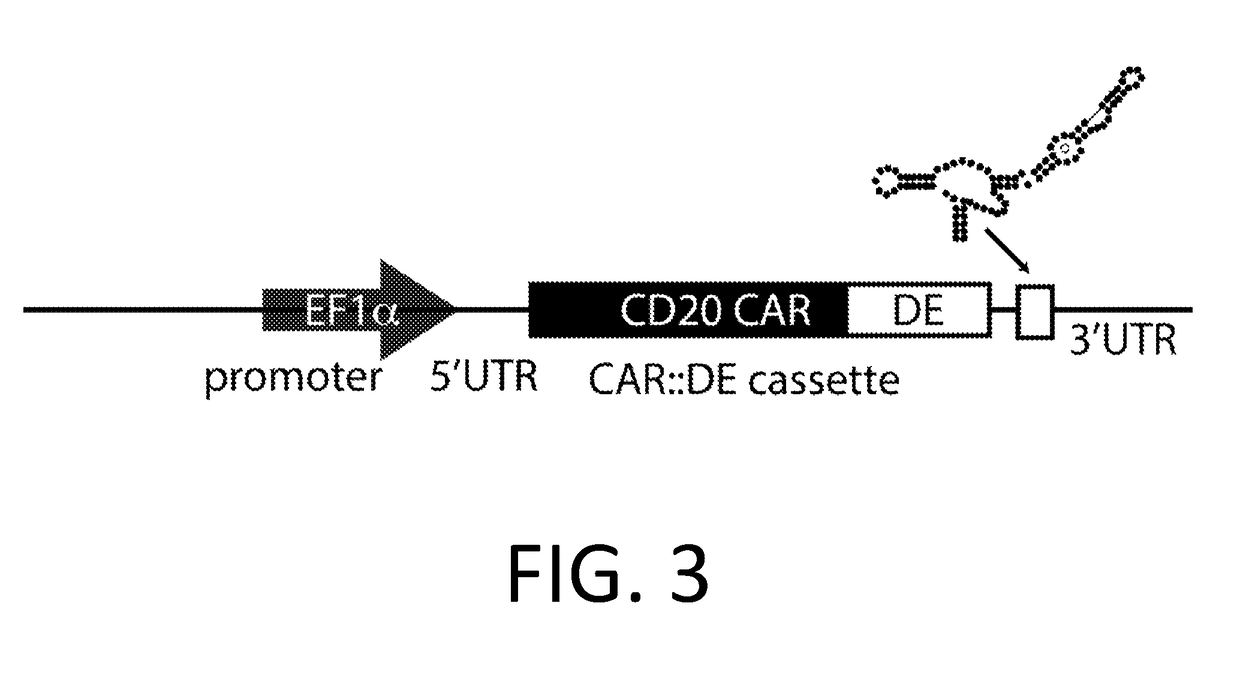Smart CAR devices, DE CAR polypeptides, side CARs and uses thereof
a car and smart technology, applied in the field of smart car devices, de car polypeptides, side cars, can solve the problems of sacrificing the surveillance benefit of transient car exposure approaches, unable to provide an adequate safeguard against toxicity, and the target toxicities seen in some patients, so as to achieve high specificity and selectivity, increase the sensitivity, the effect of increasing the sensitivity
- Summary
- Abstract
- Description
- Claims
- Application Information
AI Technical Summary
Benefits of technology
Problems solved by technology
Method used
Image
Examples
example 1
Control of T-cell Effector Activity with a Smart-CAR
[0222]A Smart Car is made using the third generation anti-CD20 CAR cassette described in Budde 2013 (Budde et al. PLoS1, 2013 doi:10.1371 / journal.pone.0082742, which is hereby incorporated-by-reference in its entirety for all purposes), and the RNA control device, 3XL2bulge9 (Win and Smolke 2007 Proc. Natl Acad. Sci. 104 (36): 14283-88, which is hereby incorporated by reference in its entirety for all purposes). A nucleic acid encoding the 3XL2bulge9 control device is engineered into the anti-CD20 CAR cassette in an appropriate expression vector.
[0223]This anti-CD20 Smart CAR is transfected by routine methods into T-cells (Jurkat cells and / or primary human T-cells), and stable populations of T-cells are selected using appropriate antibiotics (or other selection schemes). T-cell populations with anti-CD20 Smart CARs (CD20− / CD22− / CD3+) are activated by co-incubation with anti-CD3 / CD28 beads.
[0224]Activated anti-CD20 Smart CAR T-cells...
example 2
Control of T-cell Effector Activity with Combination Smart-CARs in a Human Subject
[0225]Nucleic acids encoding orthogonal Smart CARs that have specificity for distinct TAAs and respond to distinct small molecule ligands are constructed and are packaged into lentiviral vectors. Each of these Smart CARs demonstrate in vitro cytotoxic T-cell effector function and antigen-dependent expansion in response to cognate ligand exposure, and individually have known therapeutic windows in human patients.
[0226]To treat a human subject with tumors that express the defined set of multiple TAAs that are recognized by this Smart CAR pool, autologous T-cells are harvested from a patient's peripheral blood by apheresis and transduced ex vivo with lentivirus encoding the cognate Smart CARs, either individually or in pools. Expanded Smart CAR CD4+ and / or CD8+ T-cells are then adoptively transferred back into the patient. Each Smart CAR is individually activated with its own cognate small molecule ligand...
example 3
Control of T-cell Effector Activity with a DE-CAR
[0227]A DE-CAR is made using the anti-CD20 CAR cassette described in Budde 2013 (Budde et al. PLoS1, 2013 doi:10.1371 / journal.pone.0082742, which is hereby incorporated-by-reference in its entirety for all purposes), and the destabilizing element (DE) ecDHFR described in Iwamoto 2010 (Iwamoto et al. Chemistry and Biology, 2010 doi:10.1016 / j.chembiol.2010.07.009, which is hereby incorporated by reference in its entirety for all purposes). In an embodiment, the DE-CAR also encodes the RNA control device, 3XL2bulge9 (Win and Smolke 2007 Proc. Natl Acad. Sci. 104 (36): 14283-88, which is hereby incorporated by reference in its entirety for all purposes). A nucleic acid encoding the DE of mutant scDHFR is engineered into the anti-CD20 CAR cassette in an appropriate expression vector. In an alternate embodiment, a nucleic acid encoding the 3XL2bulge9 control device is further engineered into the DE-anti-CD20 CAR cassette.
[0228]This anti-CD2...
PUM
| Property | Measurement | Unit |
|---|---|---|
| pH | aaaaa | aaaaa |
| size | aaaaa | aaaaa |
| stable | aaaaa | aaaaa |
Abstract
Description
Claims
Application Information
 Login to View More
Login to View More - R&D
- Intellectual Property
- Life Sciences
- Materials
- Tech Scout
- Unparalleled Data Quality
- Higher Quality Content
- 60% Fewer Hallucinations
Browse by: Latest US Patents, China's latest patents, Technical Efficacy Thesaurus, Application Domain, Technology Topic, Popular Technical Reports.
© 2025 PatSnap. All rights reserved.Legal|Privacy policy|Modern Slavery Act Transparency Statement|Sitemap|About US| Contact US: help@patsnap.com



